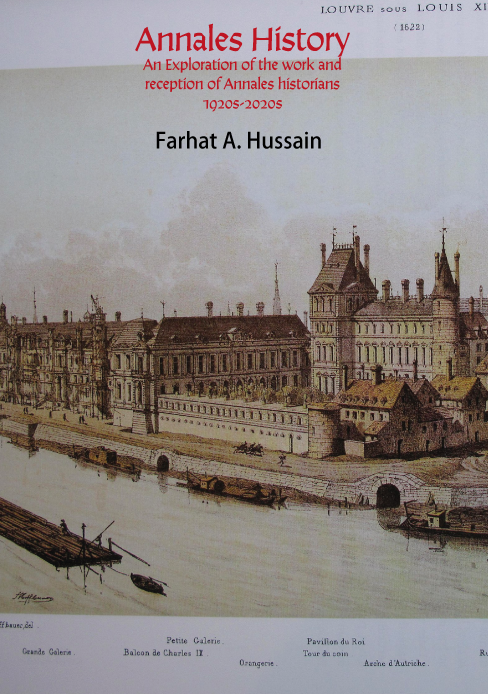
Annales History
An exploration of the work and reception of Annales historians 1920s–2020s
Author: Farhat A. Hussain
Details to follow
Extending the relevant section in Philosophy of History by the author this work examines the history and approaches of Annales historians since the inception of their approach to long duration history and mentalities. Whether or not the work of Annales historians, or those who utilised the approach of the former, may be considered a school of history is also explored. A study of different aspects of the origin, work, reception and impact of Annales historians provides the means through which to grapple with the aims and approaches of scholars in this field, thereby providing critical perspective of the very issues in historiography that Annales historians considered to be problematic and sought to address. Broader picture of a broader period versus detailed picture of a shorter or even longer period? Which is better suited to provide a perceptive insight into the past? This introductory history of the work of Annales historians reveals potential strengths and weaknesses of their approaches that were accepted with great interest and refuted throughout much of the twentieth century and demonstrates how the former collided with other approaches to history. Therefore, this work provides insight not only different aspects of Annales history but also situates this scholarship within the broader context of historiography and indeed politics and other factors that also shaped approaches to history and their rejection by some. Whether the types of history that Annales historians engaged is useful in the twenty-first century is left open for the reader to consider. Arguably, the scope and content of this work contribute to the debate of what history is, can be and ought to be. Within the plurality of views and approaches to this issue, the Annales historians have made their contribution and awareness of this subject aids in consideration of the nature and development of historical studies in recent times and the present. A substantive array of Annalistes and their work is provided and is subject to critical analysis concerning various issues, including reception in and outside of France, especially, though not solely in Britain. The value and limitation of approaches are evaluated, including via the lens of proximity in history and cosmopolitan history of the author. This book also includes exclusive interviews with those who utilised and expounded this approach and others.
Contents
Minor modification possible prior to publication
Introduction
First generation
Introduction
Lucian Febvre
Marc Bloch
Henri Hauser
Annales d’histoire économique et sociale
Surmise
Reception
Second generation
Introduction
Fernand Braudel
Pierre Chaunu
Ernest Labrousse
Georges Duby
Pierre Goubert
Robert Mandrou
Third generation
Introduction
Emmanuel Le Roy Ladurie
Philippe Ariès
Marc Ferro
Jacques Le Goff
Pierre Nora
Relationship with other approaches and disciplines
Introduction
Cultural history
Marxism
Structuralism
Gender
Cosmopolitan history
Proximity in history
Post-modernism
Sociology
Archaeology
Politics
Reception by historians in other countries
The twentieth century
Britain
Germany
The present day
Britain
Interviews
Fourth generation
Introduction
Andre Bruguière
Roger Chartier
Bernard Lepetit
Jacques Revel
In defence of Annales
Conclusion